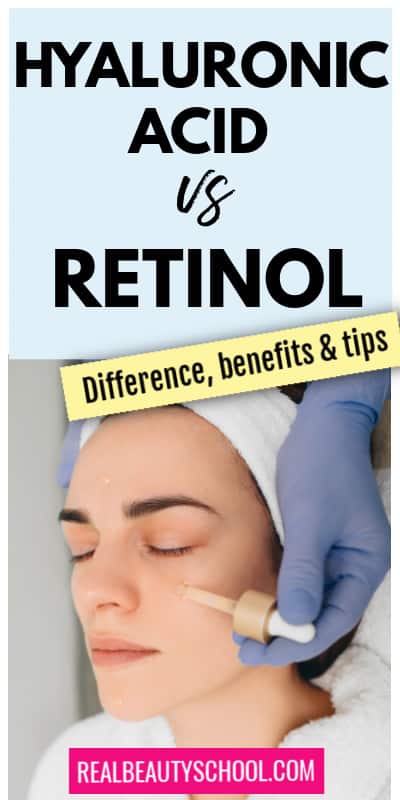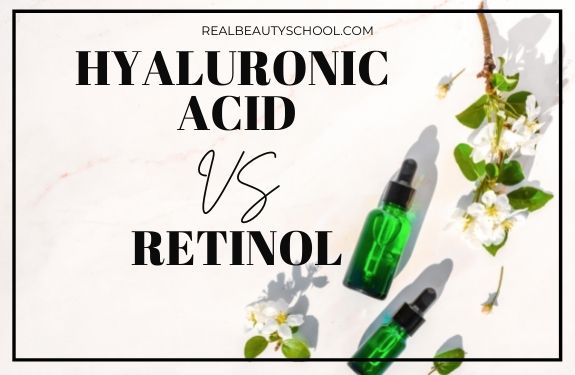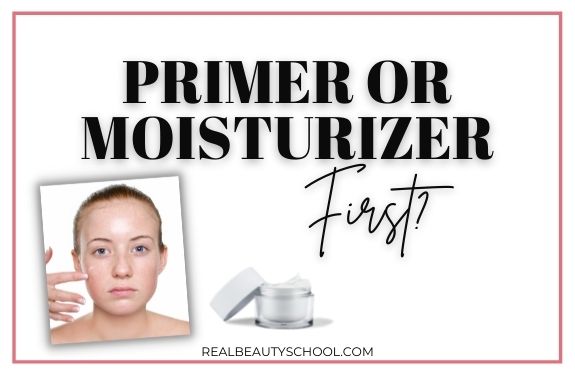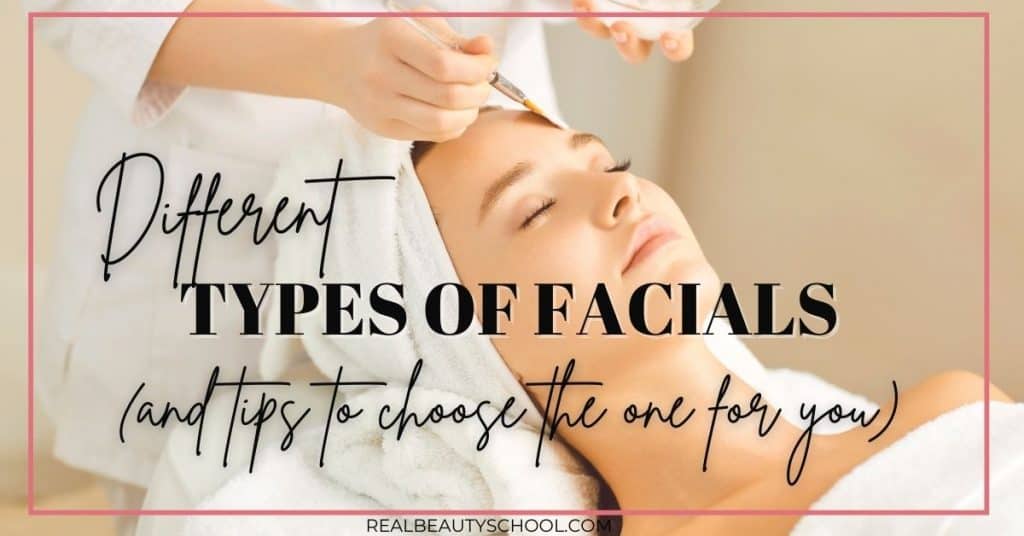Taking care of your skin, especially as you get older, is essential.
As your skin ages, your skincare needs shift, especially when your skin stops producing collagen naturally.
However, even when you know that you need different products, with the thousands of anti-aging products that exist today, it can be hard to decipher which products are actually helpful and which products are a waste of money.
If you have heard the words hyaluronic acid and retinol thrown around in the anti-aging world, then you know that they are both good for your skin, but you might not know much else about them.
What does hyaluronic acid or retinol do? Is one better than the other? Can you use both retinol and hyaluronic acid?
Today, I am answering all of these questions and more. Plus, I found a couple of my favorite serums that use these ingredients to boost your skincare routine.

This post may contain affiliate links. That means if you click and buy, I may receive a small commission (at zero cost to you). Please see my full disclosure policy for details.
Difference Between Hyaluronic Acid And Retinol
Hyaluronic acid and retinol have several similarities and differences.
As you will see below when we look at the benefits of each, they have many of the same benefits, but the biggest difference is the way in which those benefits are achieved.
First, let’s define both retinol and hyaluronic acid.
Retinol: Retinol is actually a vitamin (Vitamin A). It can be found in food as well as skincare products as it naturally increases the production of collagen.
Hyaluronic Acid: On the other hand, hyaluronic acid is a carbohydrate molecule that has the unique capability to bind water molecules.
Not only are these ingredients chemically different, but they also work to help your skin in different ways.
Since retinol is a vitamin, it works as an antioxidant and cell communicator. Basically, it tells your skin cells to die and create new cells, which is what makes your skin look more youthful.
From a chemical standpoint, your skin is literally more youthful because cell turnaround is happening at a faster rate than it would without retinol.
On the flip side, hyaluronic acid binds and retains water molecules.
While it doesn’t communicate with cells, it attracts water cells and locks them into your skin, which is why it is such a hydrating ingredient.
Another difference between the two products is how often and when you should use them.
Since retinol is a more intense ingredient, you do not want to use it every day. You should only use it a couple of times a week at most.
But, you can incorporate hyaluronic acid into your daily skincare routine.
Additionally, hyaluronic acid should be part of your morning skincare routine, whereas retinol has to be used at night.
IMPORTANT: You do not want to use retinol during the day as it will cause sun damage.
Benefits Of Hyaluronic Acid
Now that we know the difference between both of these amazing products, let’s take a look at all things hyaluronic acid.
The first thing you should know is that hyaluronic acid has been on the skincare scene for decades. This product is tried, tested, and true.
While many trends come and go, it has been proven over and over again that hyaluronic acid does what it promises, and delivers real results.
Let’s check out all of those results below!
Hydration: The most important thing that hyaluronic acid does is hydrate your skin. In fact, it can hold 1000x its weight in water, which means A LOT of hydration is coming your way! (if used properly)
Perfect for Dry Skin: If you have dry skin, no matter your age, you need a skincare product that has hyaluronic acid. There is no better ingredient to increase hydration and moisture in your face than this one.
Smooth Texture: With hydration comes a smooth texture, which is another benefit of hyaluronic acid.
When you use a product with this ingredient, you can be sure that your face will feel soft. Plus, hyaluronic acid also brightens your face, which will give you a more youthful appearance.
Perfect for Any Skin: While some people find retinol to be too abrasive, hyaluronic acid can literally fit any age and skin type.
Whether you have dry, oily, young, or mature skin, this ingredient will benefit you in some way or another, because your face could always use more hydration.
Our #1 Hyaluronic acid serum recommendation is this one here by Vichy, it pumper skin appearance, enhanced moisturizing, and for my makeup lovers, is also a great primer. It is good to use under moisturizer and will enhance the properties of face creams!
Benefits Of Retinol
Now that we have looked at the benefits of hyaluronic acid, let’s check out retinol.
This skincare product is a little newer to the skincare world.
It does not have as much history as hyaluronic acid, but the results that it has delivered have taken the world by storm.
Let’s check out a few of the reasons why.
Reverses Aging: As I mentioned above, this ingredient literally makes your skin younger, which is why so many skincare gurus refer to it as the #1 anti-aging ingredient.
It reduces wrinkles and fine lines, plus it erases dark spots.
Fights Acne: If you thought retinol was just for mature skin, think again. If you have tough acne, retinol might just be the solution you’ve been looking for.
It is a perfect over-the-counter product for those who struggle with acne breakouts.
Increases Collagen: As I mentioned earlier, retinol naturally increases your production of collagen.
If you didn’t know, collagen is a protein that holds your skin together, which is what keeps it from sagging or drooping.
In your mid-twenties, your natural production of collagen is significantly reduced, which is why you want to look for a product that either has collagen or helps your body produce it.
Retinol does just that, which is why your skin will look tighter and plumper after using this ingredient!
Our #1 recommendation for a Retinol Serum is this one here by CeraVe. It is great and at a very reasonable price!
Which Is Better Retinol Or Hyaluronic Acid
After learning so much about each of these products, you might be wondering, which one is better?
Well, both of these products are great in their own way, so determining which is better is really dependent on your specific skincare needs.
If you are struggling with dry skin, then hyaluronic acid will be at the top of your list.
If you are in desperate need of some wrinkle repair, then retinol is the product for you.
But, as you will see below, both products are at their best when they are used together.
Can You Use Hyaluronic Acid And Retinol Together?
You can absolutely use hyaluronic acid and retinol at the same time, you do not need to pick one or the other.
They will not work against each other because they work in different ways on a chemical level.
In fact, using both will boost your skincare routine and leave your skin looking and feeling youthful.
Additionally, if you use hyaluronic acid, it can actually help combat some of the irritation that retinol might cause!
Plus, if you want a third amazing ingredient to add to the list, keep reading!
Do You Use Retinol Or Hyaluronic Acid First?
As I mentioned earlier, hyaluronic acid should be used during your morning skincare routine, and retinol should be used at night. While technically you use hyaluronic first, you should be using them at completely different times of the day.
Hyaluronic Acid Vs Retinol For Wrinkles
If you aren’t interested in using both products and you want the best product for wrinkles, retinol is your best bet. Since it increases your collagen and it produces new skin cells at a faster rate, you will notice a reduction in your fine lines and wrinkles.
But, don’t count hyaluronic acid out of the running just yet.
To keep your skin looking youthful after retinol has done its repairs, you should use a moisturizing ingredient like hyaluronic acid.
This is another reason why using both of these products together is the best direction to take!
Hyaluronic Acid vs Retinol vs Vitamin C
When skincare experts talk about hyaluronic acid and retinol, sometimes you will hear a third ingredient thrown into the mix: Vitamin C.
Vitamin C works on your skin tone and can help with hyperpigmentation.
It can help brighten your skin and neutralize the damage done by free radicals (molecules that damage skin cells).
Including this ingredient in your skincare routine is another way to boost your skin’s health and leave it looking and feeling more youthful.
Best Hyaluronic Acid And Retinol Serum
Now that you know everything you need to know about hyaluronic acid and retinol, I wanted to highlight two of my favorites!
Neutrogena Rapid Wrinkle Repair Retinol Oil
✅Pros:
Perfect for Mature Skin: This serum in particular is crafted for mature skin. This oil is crafted with 0.3% retinol. This is a high concentration of retinol, which means it will offer intense repair and leave your face looking more youthful.
Fast Results: Neutrogena promises that this retinol oil will show results in just one week, and many customers can confirm this. Customers love that they don’t have to use this product for long before they start seeing results.
Dermatologist Recommended: This oil is also dermatologist recommended so you can have confidence using this over-the-counter product.
Perfect for Dark Spots: Not only does this oil help with fine lines and wrinkles, but it can also help erase dark spots!
Affordable: Finally, I love that this product is such high quality for such a low price!
⭕️Cons:
Stings: This is a product that you have to gradually incorporate into your skincare routine.
Since it is such a high concentration of retinol, it can cause stinging and/or burning.
I recommend starting to use this product once or twice a week, and then gradually increasing your use as your skin adjusts to the retinol.
Peeling: This product might also cause peeling, depending on how often you use it and how sensitive your skin is. If you have extremely sensitive skin, I would suggest using a product with a lower retinol concentration.
YEOUTH Retinol Serum
✅Pros:
Healthy Ingredients: Not only does this serum have retinol, but it also has a few other key ingredients that are fantastic for your skin.
This serum contains hyaluronic acid, which we already know has so many great health benefits.
It also has Vitamin E and Aloe Vera which evens skin tone and soothes your skin.
Boosts Collagen Production: Another great feature of this retinol serum is that it boosts your collagen production, which is essential for mature skin!
Shrinks Pores: The benefits of this serum do not end!
Not only does it reduce wrinkles, but it also shrinks pores and helps with acne scarring. This serum is perfect for not just aging skin, but for younger skin as well!
Fast Results: Like the Neutrogena oil, this serum also produces real results quickly.
Some customers noticed a difference in just one day!
Less Harsh: This serum has less retinol in it than the Neutrogena oil, so if you are looking for a product that is a little less intense, give this serum a try!
⭕️Cons:
Strong Smell: One con with this serum is that it has a strong chemical smell, which was off-putting for some customers.
Dries out Skin: While there were not many customers that had this complaint, there were a few that claimed this product actually dried out their skin instead of hydrating it.
If your skin is especially dry, this product might be a little more difficult to use.
Conclusion on Hyaluronic Acid vs Retinol
Taking care of your skin is so important, and hyaluronic acid and retinol are two products that you do not want to miss out on.
As you can see, both serve vital purposes for all skin types, but especially for aging skin.
Hyaluronic acid is the perfect way to combat dry skin and leave it feeling hydrated, whereas retinol knocks out pesky acne and fights off wrinkles!
No matter what kind of skin you have, you will benefit from using these two key ingredients (especially together). Try them both out and see the difference today!
Bye-Bye
Valeria!
What’s Next? More Skincare Related Posts:
- The Best Face Hydrating Cleansers for Dry Skin (Guide + Tips)
- The Best Face Cleansers for Oily Skin (Complete Guide)
- Micellar water VS Toner: Everything you need to know! + Tips
- My top 10 Favorite Anti-aging Night Creams
- The Exact 6 Skin-prep Steps I do before Makeup to Always get Flawless Face



